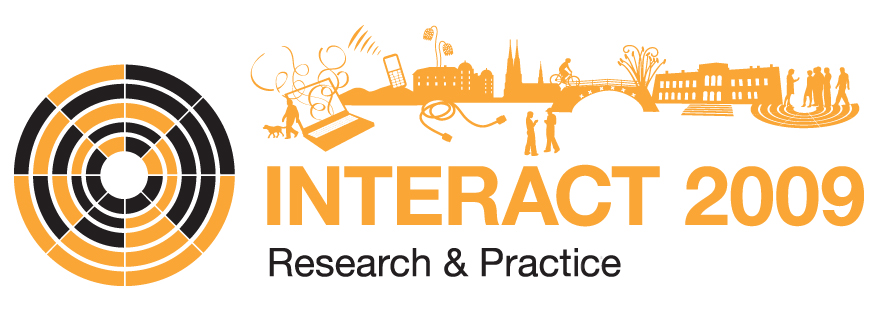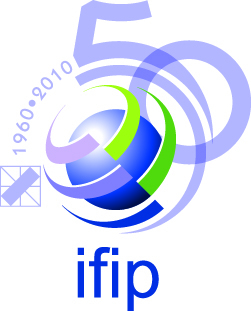Workshops
Workshops are a chance for members to compare their experiences and explore research issues or topics of special interest to the HCI community. You will meet other participants in the context of a focused discussion. If you are working in an emerging area in HCI, consider organizing a workshop. They are an opportunity to move the field forward and build a community. INTERACT workshops might address basic research, applied research, HCI practice, new methodologies, emerging application areas, design innovations, management and organizational issues, or HCI education. Each workshop should generate ideas that give the HCI community a new, organized way of thinking about the topic, or ideas that suggest promising directions for new research. Some workshops result in edited books or special issues in journals; you may consider including this goal in the design of your workshop.
Workshops should have specific objectives and address stimulating topics. They should have a limited number of participants (10-25). Workshops will take place on 24 and 25 August 2009, immediately preceding the main conference. Proposals should include key organizers, objectives, theme/topic, workshop organization and duration, target audience, and expected outcomes.
Workshops Co-Chairs
Gitte Lindgaard
Anders Jansson
What is an INTERACT Workshop?
Workshops will be held on Monday 24th and Tuesday 25th August 2009. A workshop may be one or two days in length and should be scheduled to use 6 working hours per day, with a mid-morning break, a lunch break, and a mid-afternoon break. Workshops typically have 10 to 25 participants. Focused interaction among participants is important, so participants should have informed positions based on prior experience.
There are two types of people involved in workshops: workshop organizers and workshop participants. Workshop organizers submit a workshop proposal to INTERACT. The proposals are reviewed and are either accepted or rejected. Workshop participants attend the workshop. If a person is interested in being a workshop participant, he or she must submit a position paper to the workshop organizers. Position papers are reviewed by the workshop organizers using their own criteria, and workshop organizers decide on the final list of workshop participants. Workshops are only open to people who have had their position paper accepted by the workshop organizers, and who have registered for both the workshop and the INTERACT conference.
Preparing and Submitting a Workshop Proposal
1. A cover sheet
2. A proposal (3 pages)
3. An extended abstract (2 pages)
4. A call for participation to be published o the conference web site (1 page)
Part 1. Cover Sheet
Please submit a cover sheet with contact information for the primary workshop organizer. This person will be the main point of contact with the Workshop Co-Chairs.
Part 2. Proposal
Prepare a proposal for the Workshop’s reviewers. The proposal should not exceed 3 pages. It must describe the topic, provide a detailed plan for conducting the workshop (before, during, and after), and the organizers' backgrounds. Proposals should include key organizers, objectives, theme/topic, workshop organization and duration, target audience, and expected outcomes.
Part 3. Extended Abstract
Prepare a description of the workshop using a maximum of 2 pages. It should contain a summary of the workshop's goals and issues. Note that this document is the only document from the workshop that will be published in the INTERACT’09 Proceedings.
Part 4. Call for Participation
Prepare a 250-word Call for Participation suitable for publication on the INTERACT’09 web site. It should describe the format and goals of the workshop, the participant selection criteria, requirements for position papers (e.g. page length, topics to address, etc), where these papers should be submitted, and the fact that at least one author of accepted papers needs to register for the workshop and for the conference itself. Organizers are encouraged to develop an external web page with additional information about the workshop for potential participants.
Submission Format
3-page proposal and 2-page extended abstract. Submit your electronic workshop proposal and abstract by 15 January 2009 using the conference submission system made available through the official conference website www.INTERACT2009.org. Extended abstracts must be formatted according to LNCS (Lecture Notes in Computer Science) format. The extended abstracts will be published in the conference proceedings. For your convenience, a template for Microsoft Word (.doc) is provided for direct downloading at:
http://www.interact2009.org/sites/default/files/SpringerLNCS-word%20form...
At the Conference: One- or two-day sessions (24-25 August 2009) with 10-25 participants.
INTERACT Workshop Review Process
Review criteria include the workshop's potential for generating stimulating discussions and useful results; the expected community interest level in the topic; the organizers' ability to demonstrate in the proposal a well-organized process and plan for the workshop; and the overall balance of topics in the workshops program. If multiple submissions are received on the same or similar topics, the organizers may be encouraged to merge them.
Upon Acceptance of your INTERACT Workshop
Organizers will be notified of acceptance or rejection by 1 March 2009. Organizers of accepted workshops will receive detailed instructions on how to submit the final extended abstract, which is due on 30 March 2009.
Workshop Registration Fees
The workshop registration fee will be waived for two workshop organizers. All other participants will need to pay the workshop participation fee. Workshop fees for participants in 2009 are estimated to be [to be determined] for a one-day workshop and [to be determined] for a two-day workshop. In addition to the workshop fees, workshop attendees are required to register for the INTERACT conference.
Organizer Responsibilities: Before the Conference
Organizers are expected to:
Publicize their workshop: organizers of an accepted workshop are encouraged to set up and maintain locally a web page in which provide further and updated information about their workshop. The local page of the workshop will be reachable from the official INTERACT workshop site.
Solicit position papers from potential participants: A position paper is generally 2-4 pages long and outlines the submitter's view on the workshop theme and the reasons for the submitter's interest in the topic. The deadline for submitting a position paper is specified in the local web page of the workshop of interest.
Select participants on the basis of position papers submitted to them: Participants will need to be notified of acceptance by May 15 2009 in order to allow them to sign up for early registration of the conference.
Send the list of confirmed participants to the Workshops Co-Chairs: Distribute position papers and other pre-workshop materials to participants in advance of the workshop. Develop a final agenda of workshop activities
Workshop Organizer Responsibilities at the Conference
At the workshop, the organizer is responsible for facilitating discussion, maintaining productive interaction, and encouraging participation. The emphasis should be on group discussion, rather than on presentation of individual position papers. Diversity of perspectives should be encouraged.
Organizers will be expected to produce a poster summarizing the results of the workshop for the conference reception/poster session.
We will provide the following A/V equipment: projector, screen, and 1 flip chart. Workshop organizers must bring all of their own office supplies (such as markers, tape, crayons, etc.).
Workshop Organizer Responsibilities after the Conference
It is expected that workshop results will be communicated to a larger audience. In addition to the poster the organizers will produce during the conference, each workshop may be asked to produce a report for publication. We encourage additional avenues of communication, such as organizing an informal special interest group at the conference, preparing an edited book or special issues of journals following the conference, or maintaining a web site to network with others who might be interested.

